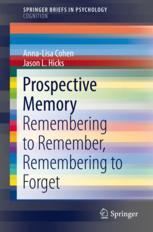

Most ebook files are in PDF format, so you can easily read them using various software such as Foxit Reader or directly on the Google Chrome browser.
Some ebook files are released by publishers in other formats such as .awz, .mobi, .epub, .fb2, etc. You may need to install specific software to read these formats on mobile/PC, such as Calibre.
Please read the tutorial at this link: https://ebookbell.com/faq
We offer FREE conversion to the popular formats you request; however, this may take some time. Therefore, right after payment, please email us, and we will try to provide the service as quickly as possible.
For some exceptional file formats or broken links (if any), please refrain from opening any disputes. Instead, email us first, and we will try to assist within a maximum of 6 hours.
EbookBell Team

4.8
54 reviewsThis Brief offers a comprehensive and up-to-date overview of the current developments in the field of prospective memory, or memory for delayed intentions. It explores several key areas in prospective memory research, including computational modeling, neuroscience and prospective memory, output monitoring, and implementation intentions. It seeks to increase understanding of prospective memory as well as offer the latest and most compelling findings in the field.
Prospective memory, or the act of remembering to carry out a previously formed intention, requires the processes of encoding, storage, and delayed retrieval of intended actions. Chapters in this Brief discuss the implementation and execution of intended actions, as well as the conditions in which they can fail. In addition, chapters also include reviews of the current state of the neuroscience of prospective memory as well as developments in statistical modeling. Laboratory research in the field of prospective memory began in the late 1980s and since then, the number of studies has increased exponentially. This Brief provides timely and relevant information in a field that is ever expanding and growing.This Brief is an informative resource for researchers and undergraduate and graduate students in the field of psychology, cognitive psychology, and neuroscience.